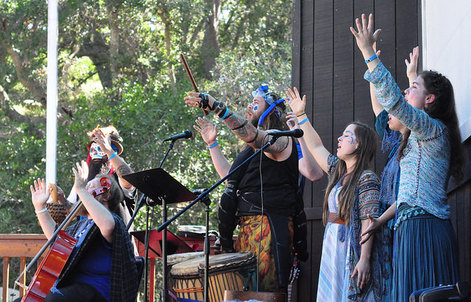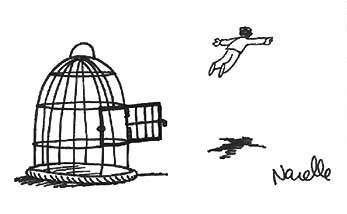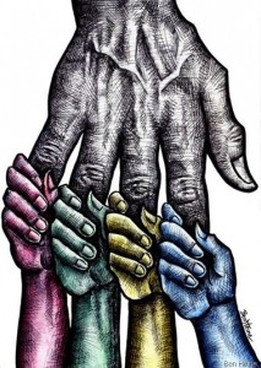|
By: Tevyn East, Jay Beck, and Tim Nafziger  Photo Credit: Tim Nafziger Photo Credit: Tim Nafziger In one way or another, all of us working for social change seek to turn the world upside down and topsy turvy. It’s a vision that goes all the way back to Mary’s Magnificat. What would happen if we actually sought to incarnate that vision of our world turned on its head? Imagine a band of holy fools: living between worlds, threading church into Big Top dream and big band protest. They are creating space to deviate from the norm, to shape-shift through characters, to re-approach the old sacred stories from the groan of creation to a radical reclamation of the earthy truth within the Gospel narratives. They are topsy-turvy tight-rope walkers entwined between the worlds of faith, art and activism, dream-makers jesting on a grand scale. Their cross-cultural and mixed-media inspiration surges at the intersection of ancient and contemporary, of flesh and spirit, resounding in mythopoetic, syncretistic, voices of the sacred. They weave the elements, let the symbols speak, and call all to dance with the drum. This is the experiment we call the Carnival de Resistance.
Comments
By: Ric Hudgens  At the beginning of the twentieth century it was theologian Karl Barth who first raised the question of a domesticated God: a God tamed, confined, and muted by humanity’s drive to control and domination. Only a few years later Europe saw that the progressive domestication of God did not lead to freedom but to the furnace and the gulag—not to the heavenly city of the eighteenth century Enlightenment philosophers, but to the hell of the twentieth century totalitarians. The church has been just as afraid of an undomesticated, wild God as the world has been. When Moses heard the voice of the Lord in the desert at Sinai and asked for a name he was told, “I will be who I will be”—deal with it! When Jesus tried to talk about the basileos of God he had to reach for verbal and enacted parables because this movement’s exact outlines could never be fully anticipated. When the Holy Spirit came on Pentecost the early church began an unpredictable “wild goose” chase, starting new Jesus-communities everywhere they were led.  Editor’s Note: Make sure to read parts one, two, and three before this last part in Dan Oudhorn’s series challenging the somewhat flimsy ways we’ve tried to embrace the way of Jesus even as we accommodate the “death-dealing powers of our day.” Be forewarned–this is the most provocative part of the series. All too often, those involved in Christian communities are so solely focused upon enacting a creative, life-giving alternative that they end up neglecting the concomitant work of resistance to the death-dealing powers of our day. This is a point I have inherited from cultural theorists and philosophers like Jean-Paul Sartre, Michel Foucault, and Jacques Derrida. If, in the context of death, we wish to participate in something that is new and life-giving, then we must simultaneously, if not first of all, engage in the destruction of that which is death-dealing. So, for example, taking feminism seriously requires us to not only ensure that women and men are accorded the same status and judged by the same standards; it also requires us to abolish previous structures, attitudes, and discourses that were patriarchal and androcentric. Or, to take a second example, we can see how the worship of YHWH necessarily requires the Israelites to destroy their idols in the Old Testament, and necessarily requires Jesus to overturn the tables of the moneychangers in the New Testament. Therefore, if we are hoping to be involved in communities of new creation, committed to life, love, solidarity, and justice; then we must also be committed to resisting and destroying that which is given over to death, hatred, alienation and injustice. It is not enough for us to simply focus upon being a creative alternative to the status quo. We must also attack the status quo. Doing so does not mean that we have given in to a “false soteriology”. I once thought this, given the way I have been influenced by the Duke School and scholars like Stanley Hauerwas and William Cavanaugh. Both Hauerwas and Cavanaugh have made convincing arguments that liberal democracies operate with a false soteriology and look to the State for salvation… when in actuality salvation is found in Christ and in the Spirit-empowered community of those who follow him.  Editor’s Note: In parts one and two of this series, Dan Oudshoorn explored the challenges (and hypocrisies) of living in solidarity with folks in the “margins.” Now his attention begins to shift towards the necessity of resistance if we are to participate in liberated communities. In this article, he explores the way in which private property under-girds injustice. If we are serious about our desire to share space, share life together, and participate in God’s new creation, then we must seriously reconsider our understanding of and relationship to private property. Indeed, the more I study the Bible and economics, the more I am convinced that private property is at the core of many of the problems we face and is, itself, a fundamentally anti-Christian belief and practice. There are three sources that have been particularly influential upon me in this regard. The first is the book Faith and Wealth by Justo Gonzalez. In this book, Gonzalez demonstrates the ways in which the Church Fathers consistently and strenuously attacked notions of private property and replaced those notions with a biblical theology that stresses that everything in creation and culture exists as a gift of God for the benefit of all. Furthermore, because the God of the Bible is defined by acts of benevolent and abundant giving, the same characteristic should define the people who follow this God. Therefore, if we wish to live in light of the biblical traditions, we would do well to draw our inspiration from the pre-monarchic economics of the Hebrews, from the correctives offered by the prophets, from the type of collectivity practiced by the early community of disciples gathered around Jesus, and from the economic mutuality that comes to the fore in the Collection that dominates the later years of Paul’s Aegean mission. Therefore, Gonzalez convincingly demonstrates that those who participate in the economy of the Christian God should reject any economics premised upon a right to private property.  Editor’s Note: In part one of this series, Dan Oudshoorn suggested the ease with which Christian communities become flawed, self-congratulatory groups that still look like the middle-class status quo. In this part of the series, Dan challenges the shallow (at best) and colonial (at worst) attempts to relocate into the “bad part of town.” Any talk of Christian community must give priority to the question of what it means to move into more intimate forms of community with people who are marginalized, oppressed, and abandoned. This is not to say that every Christian community must be open to all these people—for example, in our community in Vancouver’s downtown eastside, we quickly realized that we couldn’t focus upon being a safe place for both the low-track female sex workers we met, and for a good many of the homeless men from the neighborhood—but prioritizing one population amongst those who have been abandoned is absolutely essential to developing intentional Christian communities. If, that is, these communities are to be more than self-serving entities that fill the void we have discovered in our own middle-class lives. Because the truth is that it is incredibly easy to establish a community that others will consider ‘radical’ and ‘inspiring’ but that, in actuality, does little or nothing for anybody apart from making those who live in that community feel good about themselves. I know this, because I experienced this. Granted, it wasn’t my intention to do so, but when I was living in Vancouver’s downtown eastside, I was constantly confronted by how easy it was to move into a poor neighborhood, engage in a few acts of hospitality (hosting sex workers for dinner, having strung-out kids stop by to come down from bad trips, allowing some people to crash on our couch) but, all in all, continue to live a life of distinctive privilege and near total insignificance . . . while simultaneously being treated as though I was some sort of Christian superstar. It would have been easy to buy into the hype I was receiving from others—and I know some who live in intentional community settings who have done this—so beware of the respect others will give you. At the very least, it’s a double-edged sword. Recall the ending of the movie, The Devil’s Advocate. If the devil doesn’t get us to serve his purposes through money, sex and power, he’ll get us to serve his purposes by congratulating us on how holy and good we are.  Editor’s Note: This is the first of a four part series by Dan Oudshoorn exploring some obstacles (and possibilities) in creating liberated communities. In this series, Dan offers a hearty challenge to our rather bourgeois attempts of living into the root of Jesus’ kingdom. It seems particularly appropriate for the Lenten season. I would like to begin by reading a passage from Slavoj Žižek’s recent defense of communism in light of the failures of democratic liberalism and the horrors of global capitalism. This passage relates a joke that isn’t funny (and I warn you–it is vulgar) but it hammers home a point that I hope will be taken very seriously by those of us gathered here today. Let me quote Žižek: In the good old days of Really Existing Socialism, a joke popular among dissidents was used to illustrate the futility of their protests. In the fifteenth century, when Russia was occupied by Mongols, a peasant and his wife were walking along a dusty country road; a Mongol warrior on a horse stopped at their side and told the peasant he would now proceed to rape his wife; he then added: “But since there is a lot of dust on the ground, you must hold my testicles while I rape your wife, so that they will not get dirty!” Once the Mongol had done the deed and ridden away, the peasant started laughing and jumping with joy. His surprised wife asked: “How can you be jumping with joy when I was just brutally raped in your presence?” The farmer answered: “But I got him! His balls are covered in dust!” This sad joke Žižek goes on to say] reveals the predicament of the dissidents: they thought they were dealing serious blows to the party nomenklatura, but all they were doing was slightly soiling the nomenklatura’s testicles, while the ruling party carried on raping the people… |
Disclaimer
The viewpoints expressed in each reader-submitted article are the authors own, and not an “official Jesus Radicals” position. For more on our editorial policies, visit our submissions page. If you want to contact an author or you have questions, suggestions, or concerns, please contact us. CategoriesAll Accountability Advent Anarchism Animal Liberation Anthropocentrism Appropriation Biblical Exegesis Book Reviews Bread Capitalism Catholic Worker Christmas Civilization Community Complicity Confessing Cultural Hegemony Decolonization Direct Action Easter Economics Feminism Heteropatriarchy Immigration Imperialism Intersectionality Jesus Justice Lent Liberation Theology Love Mutual Liberation Nation-state Nonviolence Occupy Othering Pacifisim Peace Pedagogies Of Liberation Police Privilege Property Queer Racism Resistance Resurrection Sexuality Solidarity Speciesism Spiritual Practices Technology Temptation Veganism Violence War What We're Reading On . . . White Supremacy Zionism ContributorsNekeisha Alayna Alexis
Amaryah Armstrong Autumn Brown HH Brownsmith Jarrod Cochran Chelsea Collonge Keith Hebden Ric Hudgens Liza Minno Bloom Jocelyn Perry Eda Ruhiye Uca Joanna Shenk Nichola Torbett Mark VanSteenwyk Gregory Williams Archives
October 2017
|
Search by typing & pressing enter

 RSS Feed
RSS Feed